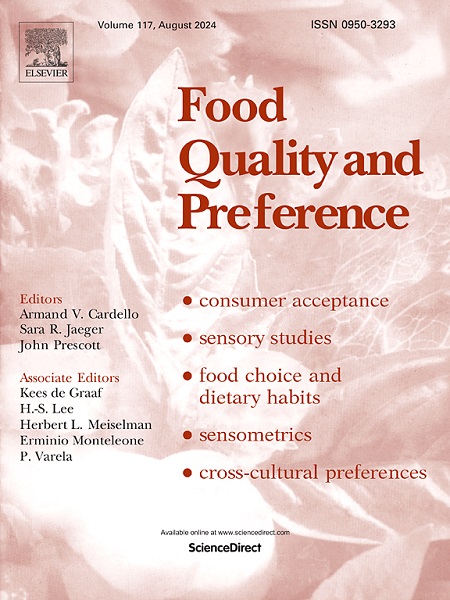Health and environmental goals as drivers of Norwegian salmon consumption: A theory of reasoned goal pursuit approach
IF 4.9
1区 农林科学
Q1 FOOD SCIENCE & TECHNOLOGY
引用次数: 0
Abstract
Amid growing public concern about farmed fish, this study examines the drivers influencing consumers' purchase of Norwegian salmon in three European countries (Italy, Poland, and France), focusing on how health and environmental goals affect the motivation to consume Norwegian salmon. We applied the recent Theory of Reasoned Goal Pursuit (TRGP) – an extension of the well-established Theory of Planned Behaviour (TPB) – to data collected via an online survey of 765 salmon consumers (France: n = 260; Italy: n = 252; Poland: n = 253). The TRGP predicted behavioural intentions significantly better than the TPB (an overall increase of 12.5 % in explained variance) while maintaining similar explanatory power for self-reported consumption. Consistent with both TPB and TRGP, intention emerged as the main predictor of consumption, and a significant motivation–intention–behaviour relationship was observed across all countries. These findings reinforce the importance of targeting the determinants of intention in interventions aimed at influencing behaviour. Notably, this study is the first to apply the TRGP in a food consumption context, highlighting how incorporating consumers' active goals (health and sustainability) can improve the prediction of intentions. Our results underline the value of a goal-oriented approach to understanding food choices and offer practical insights for promoting healthy and sustainable salmon consumption.
健康和环境目标作为挪威鲑鱼消费的驱动因素:理性目标追求方法的理论
在公众对养殖鱼类日益关注的背景下,本研究考察了影响三个欧洲国家(意大利、波兰和法国)消费者购买挪威鲑鱼的驱动因素,重点关注健康和环境目标如何影响消费挪威鲑鱼的动机。我们将最近的理性目标追求理论(TRGP)——已确立的计划行为理论(TPB)的延伸——应用于通过对765名鲑鱼消费者(法国:n = 260;意大利:n = 252;波兰:n = 253)进行的在线调查收集的数据。TRGP对行为意图的预测明显优于TPB(解释方差总体增加12.5%),同时对自我报告的消费保持类似的解释能力。与TPB和TRGP一致,意向成为消费的主要预测因素,并且在所有国家都观察到显著的动机-意向-行为关系。这些发现强化了在旨在影响行为的干预措施中针对意图决定因素的重要性。值得注意的是,这项研究首次将TRGP应用于食品消费背景,强调了如何结合消费者的积极目标(健康和可持续性)来提高对意图的预测。我们的结果强调了以目标为导向的方法对理解食物选择的价值,并为促进健康和可持续的鲑鱼消费提供了实际的见解。
本文章由计算机程序翻译,如有差异,请以英文原文为准。
求助全文
约1分钟内获得全文
求助全文
来源期刊

Food Quality and Preference
工程技术-食品科技
CiteScore
10.40
自引率
15.10%
发文量
263
审稿时长
38 days
期刊介绍:
Food Quality and Preference is a journal devoted to sensory, consumer and behavioural research in food and non-food products. It publishes original research, critical reviews, and short communications in sensory and consumer science, and sensometrics. In addition, the journal publishes special invited issues on important timely topics and from relevant conferences. These are aimed at bridging the gap between research and application, bringing together authors and readers in consumer and market research, sensory science, sensometrics and sensory evaluation, nutrition and food choice, as well as food research, product development and sensory quality assurance. Submissions to Food Quality and Preference are limited to papers that include some form of human measurement; papers that are limited to physical/chemical measures or the routine application of sensory, consumer or econometric analysis will not be considered unless they specifically make a novel scientific contribution in line with the journal''s coverage as outlined below.
 求助内容:
求助内容: 应助结果提醒方式:
应助结果提醒方式:


